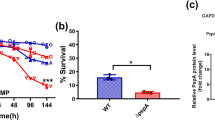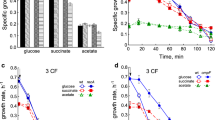Abstract.
Compared with growing bacteria, carbohydrate-starved cells of Enterococcus faecalis show development of a multiresistance state against heat, H2O2, acid, and ethanol, but not against UV irradiation. The kinetics of acquisition of resistance is different according to the stress. Three hours of starvation provide maximal resistance against ethanol, while the tolerance to heat, H2O2, and acid increases progressively with the duration of starvation. Chloramphenicol treatment does not abolish the ethanol tolerance. Protein synthesis inhibition during the transitional growth phase and the first hours of starvation partially inhibit the acquisition of heat and oxidative resistances. Antibiotic treatment after 3 h of starvation does not affect the increase of these resistances. We suggest that synthesis of specific proteins revealed by 2-D gel analysis in the first 3 h of starvation, followed by a second mechanism related to protein degradation or alteration, is necessary for acquisition of maximal resistance towards heat and oxidative stresses.
Similar content being viewed by others
Author information
Authors and Affiliations
Rights and permissions
About this article
Cite this article
Giard, JC., Hartke, A., Flahaut, S. et al. Starvation-Induced Multiresistance in Enterococcus faecalis JH2-2. Curr Microbiol 32, 264–271 (1996). https://doi.org/10.1007/s002849900048
Issue Date:
DOI: https://doi.org/10.1007/s002849900048




